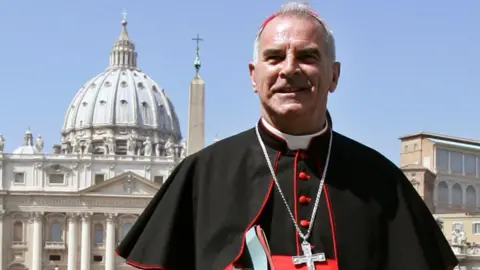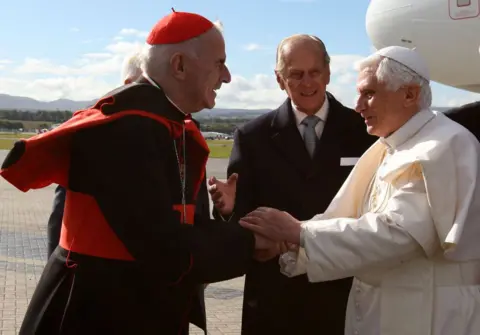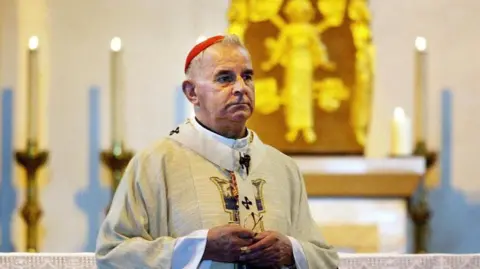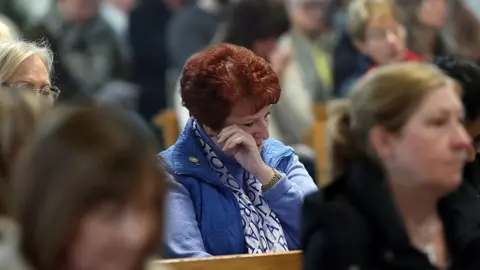Scotland's cardinal scandal still casts a shadow as conclave begins
 Reuters
ReutersThe voting process to elect a new Pope, which is getting under way in Rome, will be the second conclave in a row without a cardinal from Scotland.
Experts believe Scotland is still in the "sin bin" with The Vatican after the country's last cardinal, Keith O'Brien, was forced to resign because of sexual misconduct allegations.
In February 2013, Cardinal O'Brien was about to take part in the ancient tradition of electing a pope - and his enthusiasm was there for all to see.
During an interview with BBC Scotland News he showed off the neat brown rectangular voting paper to be used in the secret ballot.
But it would forever remain blank.
Cardinal O'Brien, who at the time was the Catholic Church's most senior cleric in Britain, had been due to meet his peers to decide who was to replace Pope Benedict XVI - but he never made it on the plane to Rome.
The 74-year-old Archbishop of St Andrews and Edinburgh resigned days before the conclave following The Observer newspaper's allegations of inappropriate behaviour towards priests dating back to the 1980s.
The scandal sparked global media attention and rocked the Catholic Church at a time when all eyes should have been on Rome's Sistine Chapel and the process that eventually saw Pope Francis elected.
It was a seismic blow to Scotland's standing in the Catholic Church after decades of arguably punching above its weight.
How many cardinals has Scotland had?
Scotland has only ever had a handful of cardinals. The Reformation, which led to restrictions on practising Catholicism lasting centuries, was largely to blame.
Even when the Catholic Church was formally re-established in Scotland in 1878, almost a century passed before such a high-ranking appointment would be made again.
The traditional red cardinal hat was handed to Archbishop of St Andrews and Edinburgh, Gordon Gray. He took part in two conclaves - August and October 1978, which saw Popes John Paul I and John Paul II elected respectively.
But Cardinal Gray's crowning moment was in 1982 when Scotland welcomed a serving Pope for the first time.
On a roasting summer's day, an estimated 300,000 people gathered in Glasgow's Bellahouston Park for a Papal Mass celebrated by John Paul II.
 PA Media
PA MediaThe next cardinal appointed in Scotland was Thomas Winning, a miner's son from Wishaw in North Lanarkshire.
Earning the nickname "Cardinal Controversy" for his interventions on social issues – including clashing with Prime Minister Tony Blair on abortion – he died in 2001 without taking part in a conclave.
His replacement was Keith O'Brien, who had worked his way up the church's hierarchy before being proclaimed a cardinal by Pope John Paul II in 2003.
Cardinal O'Brien took part in the 2005 conclave which elected Pope Benedict XVI and then five years later welcomed the German-born pontiff to an open-air Mass, again at Bellahouston Park in Glasgow.
The clergyman, who was born in County Antrim, Northern Ireland, was on the path to retirement when the scandal that was to end his career broke in early 2013.
 Getty Images
Getty ImagesThe Observer first reported the allegations of four individuals who accused Cardinal O'Brien of inappropriate sexual behaviour within the Diocese of St Andrews and Edinburgh.
The Herald newspaper later suggested that the cardinal had used confession by young clerics as a device for sexual grooming.
He contested the allegations, but in his resignation statement there was an oblique reference to the claims.
"For any good I have been able to do, I thank God. For any failures, I apologise to all whom I have offended," he said.
While the church had accepted his resignation from high office it allowed him to keep his cardinal moniker.
After the public spotlight faded, he initially lived in a retirement home in East Lothian.
He then moved to the north east of England where in March 2018, at the age of 80, he suffered a fall and later died.
His Requiem Mass took place in Newcastle and his remains were laid to rest with his parents at Mount Vernon Cemetery in Edinburgh.
Mario I Aguilar, Professor of Religion and Politics at St Andrews University, who wrote a biography of Pope Francis, says the Scottish cardinal scandal still looms large.
"Scotland has one peccadillo and that is Cardinal O'Brien," he says.
"Cardinal O'Brien was the only cardinal in the history of the church who was sacked, so we have a stain or whatever you want to call it.
"There was scandal in Rome and therefore they wondered, what to do with the Scots?
"It was clear that the Vatican had had enough and therefore they sent Archbishop Cushley to intervene."
Leo Cushley was appointed Archbishop of St Andrews and Edinburgh and promised a period of "reconciliation and healing" for Scotland's Catholics.
Will there be another cardinal in Scotland?
 PA Media
PA MediaStephen McGinty, a documentary producer and author of This Turbulent Priest, a biography of Cardinal Thomas Winning, agrees that the O'Brien scandal still casts a shadow.
"People forget that at the time he was the highest ranking figure in the Catholic Church to be sucked into this kind of behaviour. It was a world scandal.
"Scotland has a long tradition of Catholicism and up until O'Brien it was viewed well," he said.
Mr McGinty said there had been a clear approach by The Vatican when it came to Scotland's cardinal status.
"Cardinal Winning was told that the Vatican's viewpoint was that Scotland was separate from England and Wales so it should always get a red hat, rotating between Glasgow and Edinburgh depending on who had the most senior figure.
"I have no doubt Scotland will get a red hat in the future, we're just in the sin bin at the moment."
 Getty Images
Getty ImagesFor the first time in history, fewer than half of the cardinals given a vote in the conclave to decide who will lead the world's 1.4 billion Roman Catholic will be European.
This reflects the fact the growth areas of the church are in Africa and Asia.
Professor Aguilar is less optimistic about the prospect of another Scottish cardinal any time soon.
He said: "I don't see how someone is going to let Scotland in again when there are other growing places like in Africa, for example.
"We are a very small country, there are five million Scots and 1.4 billion Catholics – you have to be realistic."
If the case for appointing new cardinals under the next Pope is a numbers game then Scotland's case is not helped by its declining Catholic population.
The last census showed, for the first time, that a majority of people in Scotland are not religious.
The change has been driven by a sharp decline in the number of people describing themselves as being Church of Scotland or Roman Catholic.
The number of Roman Catholics is down by more than 117,000 in the past decade and now stands at 13.3% of the population.
Attendance at Mass has also dropped steeply. The annual Catholic Directory for Scotland reported that the average weekly Mass attendance in 1997 was 235,613.
By 2023, this had fallen to 95,029 – part of a downward trend believed to have been accelerated by the Covid pandemic restrictions.
In the same year, there were an average of just 15 Catholic weddings a week across Scotland.
Archbishop Cushley, who became Archbishop of St Andrews and Edinburgh in September 2013, has been described as "a safe pair of hands" by Mr McGinty.
Having spent most of his career as a diplomat for The Vatican, it is perhaps not surprising that the 63-year-old's tenure as an archbishop has been relatively low profile and controversy-free.
However, he has not been made a cardinal.
Archbishop Cushley is probably Scotland's best chance of holding a voting card in future conclaves - but it will all hinge on his links to the next Pope and how long The Vatican takes to forget and forgive the "stain" of the O'Brien scandal.
